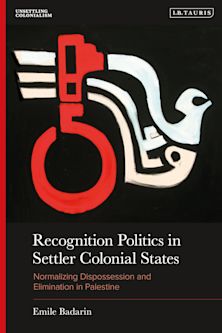- Home
- ACADEMIC
- Middle East
- Israel / Palestine
- The Spectral Palestinian
The Spectral Palestinian
Presence before Politics
The Spectral Palestinian
Presence before Politics
You must sign in to add this item to your wishlist. Please sign in or create an account
Description
Long before October 7, 2023, Palestinians haunted the West and its political categories. In this work of political theory, John Randolph LeBlanc reads works by Raja Shehadeh, Sari Nusseibeh, and Mahmoud Darwish to track the manifold ways existing political language and norms (e.g., rule of law, human rights, international law, the nation-state) failed to capture and address the experience of a people living permanently under conditions of occupation/domination. The Spectral Palestinian: Presence before Politics finds that their periodic use of the language of ghosts and haunting signals the relationship between Palestinian experience and the 'promise' of Western political language and its institutions. LeBlanc argues that this resulting sense of 'spectrality' constitutes an underexplored form of Palestinian self-awareness and agency. Initially, the specter is the product of the others' fear, that is, nearly disembodied sites of violence carrying the threat of non-being. While reading the accounts of these Palestinians' frustrating confrontations with the apparatuses and language of Western politics, LeBlanc finds the latent possibility of Palestinians taking hold of the specter's power. Turning the spectral on its authors, the Palestinian defies a political language that has abandoned them and rejects the accompanying stigmas by standing fast in their spaces and fully appearing in the demand for human dignity.
Table of Contents
Introduction
Chapter 1: Occupied Body, Occupied Mind: Transforming Vulnerability in Shehadeh's Occupation Diaries
Chapter 2: The Spectral Palestinian: Liminality and Politics in Darwish's In the Presence of Absence
Chapter 3: Collaboration, Resistance, and Implication in Sari Nusseibeh's What is a Palestinian State Worth?
Chapter 4: Joseph K. in the West Bank: Shehadeh's Palestinian 'Legal Narrative' as Kafkaesque Chain Novel
Chapter 5: Breaking the Mirror of Sovereignty in Darwish's In the Presence of Absence
Chapter 6: Tracing Our Steps: Shehadeh's Walks in a Disappearing Political Landscape
Conclusion
Bibliography
About the Author
Index
Product details

| Published | 05 Feb 2026 |
|---|---|
| Format | Ebook (Epub & Mobi) |
| Edition | 1st |
| Extent | 216 |
| ISBN | 9781978760066 |
| Imprint | Bloomsbury Academic |
| Illustrations | n/a |
| Publisher | Bloomsbury Publishing |
About the contributors
Reviews
-
Against a Zionist regime that shrinks Palestinian worldhood, The Spectral Palestinian foregrounds defiant Palestinian voices who poetically and materially refuse their containment and determination from without. Mobilizing Sari Nusseibeh, Mahmoud Darwish, and Raja Shehadeh in the struggle against settler erasure, this invaluable book shows clearly that Palestinians' hunger for liberation persists, despite or even because of multiple setbacks, failures, and disclosures of vulnerability. While Israel's genocidal project anxiously seeks to invisibilize the Palestinian by any means necessary, LeBlanc unearths in this figure's haunting non-being, its spectrality, a subversive reality that relentlessly frustrates and upends Zionist frames of intelligibility, calling for new and inventive ways of thinking the predicament of Palestinians politically.
Zahi Zalloua, Cushing Eells Professor of Philosophy and Literature and Professor of Indigeneity, Race, and Ethnicity Studies, Whitman College, USA
-
The uncertain status of Palestinians as humans worthy of flourishing lives is a result of decades of being regarded as a people without a history, without claim to a home, without voice, and without a right to resist erasure. The importance of Randy LeBlanc's work lies in the space he creates for Palestinian thinkers, writers and activists to take control over the marginalized and spectral condition to which they have been relegated. LeBlanc's readings of Raja Shehadeh, Sari Nussibeh, and Mahmoud Darwish are careful, respectful, interesting, and evocative. Their words challenge the displacement and invisibility of Palestinians with courage. They demand a world where they and their families can be safe and free once conquest in the name of self-defense is exposed as illegitimate and genocidal. The Spectral Palestinian is an illuminating and timely work of political theory.
Christopher C. Robinson, Clarkson University, USA
-
John Randolph LeBlanc's work utilizes a range of literature to question the efficacy, dexterity, and usefulness of our interdisciplinary categories in order to explore precarity, inhumanity, and to urge us to read from the viewpoint of the spectral“other." Such reading helps us to recognize our own vulnerabilities and to enter the logic of the counter-narrative, potentially, to create change. Fluent and wise, this book should upset our reliance on standard solutions to complex problems and place us in a cooperative attitude that LeBlanc opens in his conclusion: to put the concepts on the table and ask how we must attend to them so as not to render "others" spectral.
Carolyn M. Jones Medine, University of Georgia, USA

ONLINE RESOURCES
Bloomsbury Collections
This book is available on Bloomsbury Collections where your library has access.


































